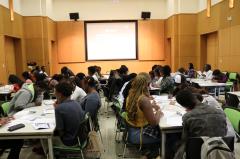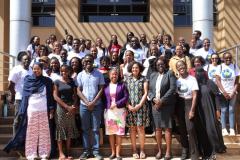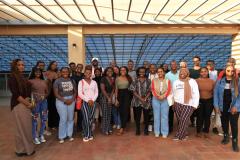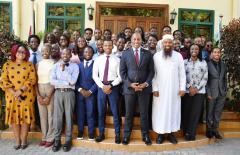The School Of Humanities And Social Sciences Hosts A Guest Lecture Themed Social Contract Theory And Rwandas Model Of Post-Genocide Nation Building
By Austine Okuto
On November 5, the School of Humanities and Social Sciences hosted a guest lecture delivered by His Excellency Ambassador Ernest Rwamucyo, the Ambassador of Rwanda to Kenya. Themed “Social Contract Theory and Rwanda’s Model of Post-Genocide Nation Building,” the event brought together faculty, staff, and students, providing a powerful platform for intellectual engagement and deep reflection on contemporary governance, identity, and nation-building within the region.
Ambassador Rwamucyo outlined Rwanda’s post-genocide reconstruction journey and the social contract principles that continue to shape the country’s transformation. The lecture underscored the importance of resilience, integrity, and visionary governance in post-conflict societies. Ambassador Rwamucyo shared Rwanda’s lessons on rebuilding trust among citizens, fostering inclusivity through policy reforms, and prioritizing youth empowerment as a cornerstone of sustainable development.
Participants raised thoughtful questions on national unity and reconciliation, approaches to genocide-related challenges, post-Kagame leadership considerations, and broader implications for regional stability and cooperation. A dynamic Q&A segment followed the Ambassador’s remarks, moderated by Mr. Lavie Mutanganshuro from the Embassy of Rwanda, whose guidance ensured an insightful and engaging exchange with the audience.
In addition to the lecture, the Ambassador also held a separate session with students from Rwanda enrolled at USIU-Africa. This engagement provided a meaningful space for personalized dialogue, mentorship, and connection with their national representation, strengthening their sense of belonging, identity, and academic motivation.
This dual engagement highlighted the value and impact of strategic partnerships. Such collaborations not only enrich students’ academic experience but also foster cross-cultural understanding, expand global networks, and reinforce USIU-Africa’s commitment to nurturing informed, globally minded graduates. The visit ultimately reaffirmed the institution’s role as a regional hub for dialogue on governance, peacebuilding, and international cooperation.




